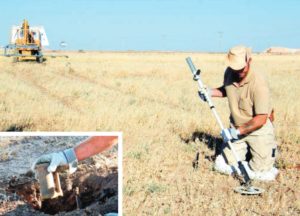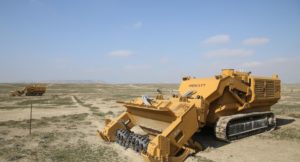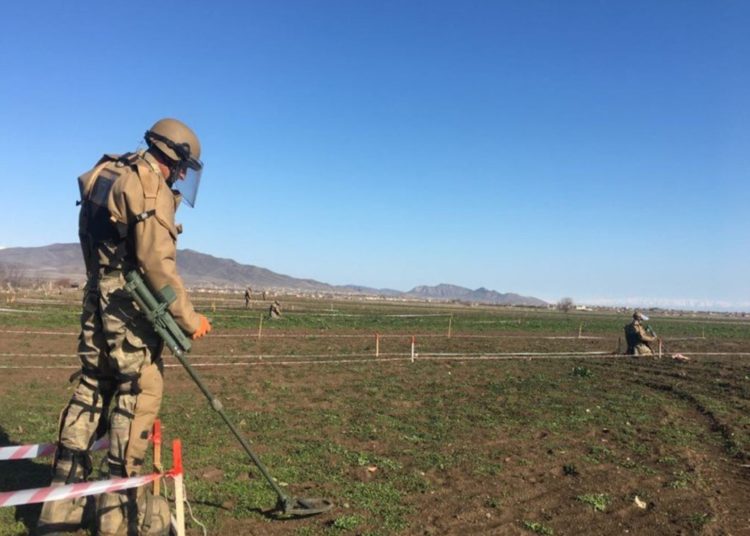Abdullah Bozkurt/Stockholm
Turkey has for the second time asked the United Nations for an extension to clear land mines in its border areas and has so far failed to fulfill its treaty obligations against a background of slow-paced action.
Turkey was obliged to destroy all anti-personnel mines in areas under its jurisdiction or control by March 1, 2014 according to the Ottawa Treaty for the Prohibition of the Use, Stockpiling, Production and Transfer of Anti-Personnel Mines and their Destruction, known informally as the Anti-Personnel Mine Ban Convention, which Turkey ratified on March 1, 2004.
Turkey was far from clearing land mines by the deadline, and Turkish diplomats on March 28, 2013 asked for eight additional years to finish clearing the mines, a request that was approved by the UN. At the time, the UN noted that no significant demining had taken place since Turkey entered into the treaty.
Despite the renewed commitment to clear the mines, Turkey remains far behind in fulfilling its obligations as the new deadline of March 1, 2022 approaches. Concerned that it wouldn’t be able to meet the deadline, Ankara sent a letter on March 26, 2021 asking for a second extension, which prompted the UN to request further information from Turkey based on Article 5, Implementation [of the convention].
This time, Turkey asked for a three year, nine month extension, until December 31, 2025 as opposed to the eight years it obtained in the first extension.
UN report shows that Turkey claimed it had overestimated the areas that were mined:
Data provided to the UN by Turkey show that a total of 519 people (civilian and military) have fallen victim to anti-personnel mines, with 89 killed and 430 injured since March 2014, when the UN gave Turkey its first extension to comply with the convention. Ankara blamed almost all the causalities on the outlawed Kurdistan Workers’ Party (PKK), which had planted improvised explosive devices, while taking no responsibility for the mines installed by the Turkish army many years ago.
The government also did not have the number broken down by gender and age until 2016 and informed the UN that a total of 213 mine victims have been registered including 182 men (152 injured, 30 killed), one woman (injured), three girls (killed) and 27 boys (17 injured and 10 killed) in the last five years.
According to Turkish government data, Turkey has still yet to clear a total of 3,834 areas measuring 145,733,105 square meters containing 855,782 anti-personnel and anti-tank mines. It has 20,275 anti-personnel mines positioned in 43 zones along the Armenian border and 116,115 mines in 471 zones along the Iranian border. Turkey has 78,917 mines at 874 places along Iraqi border. Most mines were planted along Syrian border, where 411,490 anti-personnel and 194,615 anti-tank mines remain. In total Turkey has nearly 700,000 mines that need to be destroyed by 2025. The operations are estimated to cost 107 million euros.

Turkey’s action plan that was submitted to the UN included Ankara’s cooperation with the European Union in some demining projects in Van and Hakkari provinces. When the UN asked for detailed information on the project with the EU, which covers years 2023 to 2025, Turkey had to admit that Brussels refused to fund the project for 2023-2025 for the reason that Turkey’s implementation deadline for the convention after the initial extension would expire in March 2022. Turkey said it would reapply to the EU once it gets a second extension from the UN.
There is also a problem with the accuracy of Turkey’s mine maps. In the letter to the UN Turkey claimed that some of the areas marked as mined turned out not to be the case. Ankara noted that over the course of 50 to 70 years some markings/fences along the border were replaced and extended to create a wider buffer to military access zones. This has led, it claimed, to an overestimation of the size of the mined areas having been recorded in the national mine action database, particularly in border regions. As a result Turkey argued that during the initial extension period approximately 25 to 40 percent of the areas were cancelled.

More than 1 million land mines are undetected
No mention of areas that were not marked but turned out to be mined during an examination in the field was made by Turkey. Nordic Monitor previously reported that a confidential Turkish military document showed that some areas on the border were mined even though there was no indication of it on military maps.
The document, filed by Lt. Salih Alasu on July 15, 2016, recorded an incident in which the Turkish military discovered six landmines during the construction of a concrete wall on the Turkish-Syrian border. The lieutenant submitted the report informing his superiors that the location of the Turkish land mines was not indicated on any mining map that the military had, prompting questions of how many unknown mines were still buried along the Syrian border.
More than 1 million land mines are estimated to remain undetected in Turkey. Thousands of mined areas are not cleared, and some are not marked on military maps. Ankara has destroyed over 3 million stockpiled mines and kept some for training purposes.
Full text of the UN report on Turkey issued by by the Meeting of the States Parties to the Convention on the Prohibition of the Use, Stockpiling, Production and Transfer of Anti-Personnel Mines and on Their Destruction:












